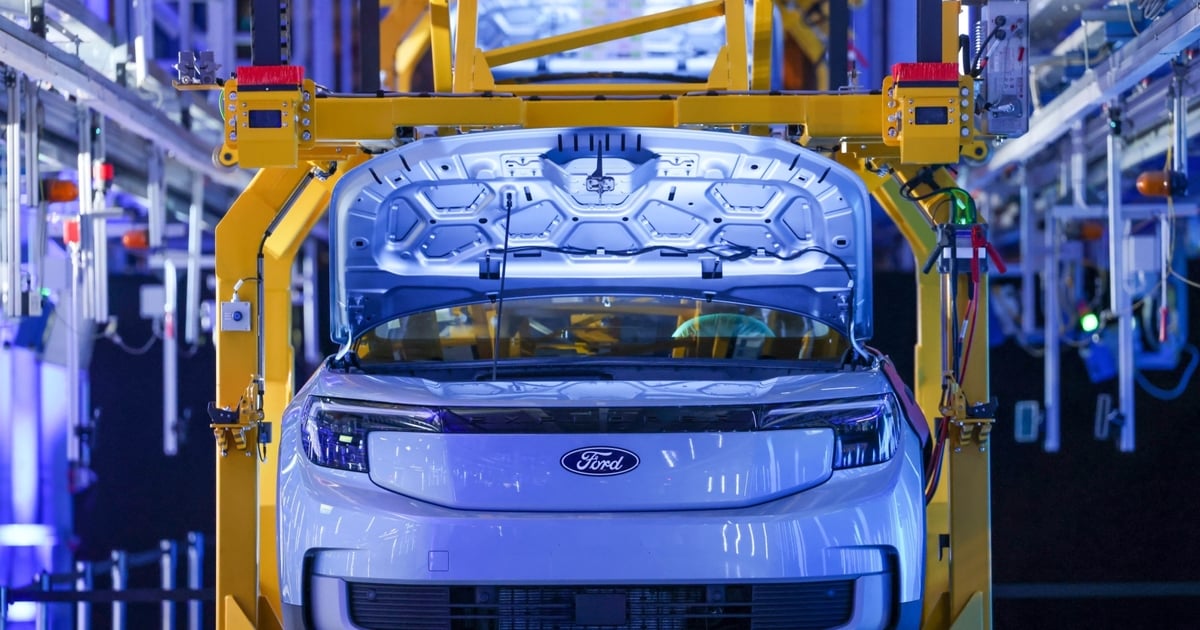
Ford Motor Co. posted second-quarter net income of $1.9 billion and increased its forecast for the year but said it expects to lose $1.5 billion more on electric vehicles than previously projected.
Citing consumer concerns with pricing, the company also scaled back EV output plans but vowed to continue on a path to earning 8 percent margins on EVs in three years.
Still, overall revenue in the quarter jumped 12 percent to $45 billion, and net income nearly tripled from a year earlier.
“It was a really strong quarter,” CFO John Lawler said in a call with media, noting it was “more evidence of what’s possible,” with the company’s Ford + growth plan.
Ford’s adjusted earnings before interest and taxes rose slightly to $3.8 billion. About $2.3 billion came from Ford Blue, the company’s gasoline-powered vehicle business. Ford made $2.4 billion on its commercial business, Ford Pro, and lost $1.1 billion on its electric vehicle business, Model e.
Ford Pro’s profit margins were 15 percent, while margins at Ford Blue were 9.2 percent.
Ford Credit generated earnings before taxes of $390 million, down from a year ago.
For the full year, Ford said it now expects adjusted EBIT of $11 billion to $12 billion, up from a prior range of $9 billion to $11 billion. It expects adjusted free cash flow in 2023 of $6.5 billion to $7 billion instead of $6 billion.
“We’ve got big ambitions, our approach is different from anyone else’s and we’re doubling down where we have competitive advantages – in trucks, SUVs and commercial vans,” Lawler said. “We think doing that, raising quality and lowering costs can earn us the kind of profitable growth and valuation that best-in-class, technology-led industrial companies command.”
Ford now expects its EV unit to lose $4.5 billion in 2023, 50 percent more than it previously forecast, citing “the pricing environment, disciplined investments in new products and capacity, and other costs.”
Additionally, Ford on Thursday delayed some production goals for EVs. It now expects to hit a 600,000 EV production run-rate some time in 2024; it previously planned to do so by the end of this year. And Ford no longer is forecasting when it plans to produce 2 million EVs annually, while it previously expected to hit that goal in 2026.
Still, Lawler said its EV profit goals remain the same: 8 percent margins in 2026.
“While the shift to EVs is unquestionably underway, the last few weeks have shown us that adoption by early majority customers will be a little slower than the industry expected,” Lawler said. “This is not going to be a straight line, there’s going to be some bumpiness as we move along.”
Ford CEO Jim Farley said the company still sees strong EV purchase consideration among potential buyers.
“There are plenty of customers,” Farley said. “The issue is the price they’re willing to pay has come down.”
Lawler told analysts that Ford no longer expects contribution margin breakeven on its first-generation EVs by the end of this year but that its goal of 8 percent EV margins in 2026 remains the same.
“While the path to sustainable profitability may not look quite the same as we’ve previously thought, we’re confident in our ability to deliver through more efficient product design, cost efficiencies and growth in software and services, which will continue to accelerate,” Lawler said.
As the EV business proves tougher to navigate, Ford says its ICE business is stronger than expected.
It increased its 2023 earnings forecast for Ford Pro from $6 billion to “approaching $8 billion,” which would be more than double that unit’s profit last year. Ford also said it expects to make about $8 billion at Ford Pro, up from prior guidance of $7 billion.
Ford said net sales in the second-quarter rose 11 percent, helping drive the 12 percent increase in revenue. Ford Pro produced a 22 percent jump in revenue, helped by the introduction of a redesigned line of Super Duty pickups.
Farley also announced Thursday that Ford will reveal a redesigned F-150 and F-150 hybrid at this year’s Detroit auto show in September. He said Ford sees promise in hybrid powertrains and plans to quadruple its hybrid sales over the next five years.